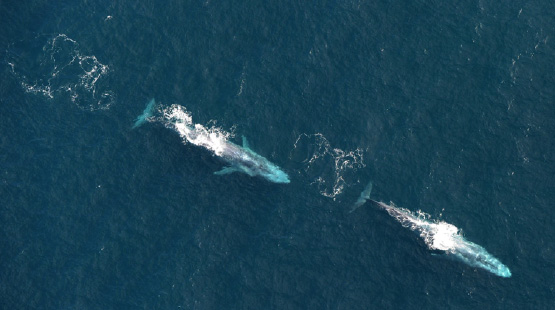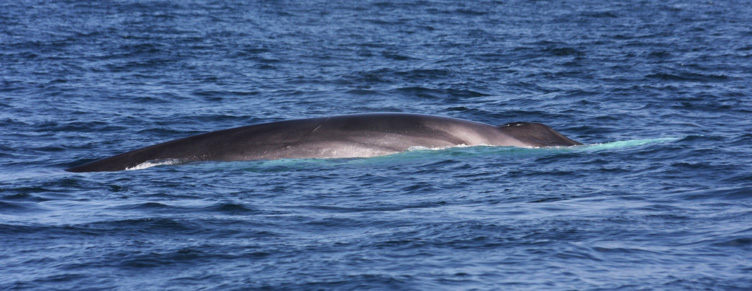Displaying items by tag: Finn whale
Voyages out as far as the edge of the Continental Shelf on the Atlantic Ocean has produced rare sightings for the Irish Whale and Dolphin Group and this August there is a chance to see the join the crew and see the whales again writes Patrick Lyne
Back in 2012 when the Celtic Mist became available to the Irish Whale and Dolphin Group we were looking at ways the boat could be used to support the work the Group does and demonstrate to people in Ireland the wealth of life that exists in Irish waters. So for three years from 2012 to 2014 we took the Celtic Mist to the shelf edge in early September. Indeed we were blessed when first arriving on the shelf edge only to be greeted by two blue whales. It took several minutes in close proximity (200m) to the whales before we believed our eyes. We had expected large whales but not those to be waiting for us. They stayed around and passed either side of the boat moving from port to starboard for what seemed like an age, before moving further away. We could manage a top speed of maybe 8 knots while blue whales could travel at up to 25 knots approximately and there was no way we could keep pace with these animals if they decided to leave us behind.
Shortly afterwards the Irish Air Corps Casa (C253) appeared and called on the radio and managed to get some excellent shots of both the Celtic Mist and the blue whales.
 Two blue whales in the Porcupine Seabight 60 miles off the Irish coast (Photo coutesy of Irish Air Corps)
Two blue whales in the Porcupine Seabight 60 miles off the Irish coast (Photo coutesy of Irish Air Corps)
In 2013 had some remarkable sightings of beaked whales again in the Porcupine Seabight and while unable to confirm that the animals that passed close to the vessel in 2013, were True’s beaked whales, it seems highly probable that they were. Beaked whales are particularly difficult to study being adverse to noise and spending large periods of time underwater. The Cuvier’s beaked whale holds the record for the longest recorded dive of any cetacean of 2 hours 17 minutes while attaining a depth of 2,992m. These animals are rarely seen close to shore and when they are, they often end up stranding and dying. The deep ocean off the shelf edge is their natural habitat.
Each year has produced it’s own spectcular moments and the humpback whales off Dingle have become more and more reliable and are a feature of our trips every year. Last year we were treated to one beautiful day on the shelf edge with calm weather. It is this calm weather that always produces the best results. While whales numbers wer not spectacular they were considerable and most if not all animals were engaged in feeding. We simply allowed the boat to drift while fin whales fed in close proimity to the boat and we could see the huge jaws opening to envelope the krill underwater.
Last year we changed vessels to Jessy of Adrigole a 37 ft–yacht, the Celtic Mist being unavailable and this year we have decided to continue using Jessy but for a longer trip. We propose starting in Castletownbere and sailing to Camaret in Brittany along the shelf edge. The shelf edge between here and Brittany is some of the most dramatic in the world with drop offs from 200m down to nearly 4000m. The EEZ of the UK is slowly squeezed such that French and Irish waters will eventually meet as boundaries extend.
It is more important than ever to record the variety and abundance of Ireland’s offshore environment. While oil exploration will suffer from the current over supply, exploration rights has been granted to both Russia and France by the International Seabed Authority (ISA – not the Irish Sailing Association but a UN body based in Jamaica) in the mid-Atlantic Ridge in the North Atlantic. The marine environment is constantly under greater and greater pressure. Protection for cetaceans is critical to mainting the entire marine habitat. Reduction in large whale numbers in the Southern Ocean due to whaling did not result in an increase in their favourite prey, krill, but rather reduced krill abundance. Whale faeces enriches the ocean with iron, producing plankton blooms which start the food chain and absorb excess carbon from the atmosphere. The South West in particualr sees large numbers of tuna arrive in August and September, follwoed by French and Spanish and Irish fishing vessel as well as whales. It is important for the whales that they are able to build blubber reserves at this time, especially for the females as without sufficient reserves to sustain them during pregnancy of 11 or 12 months, the whale will abort. Recovery rates are slow with these large whales and even with protection it will be manay many decades before fin and blue whale numbers reach pre-whaling levels.

Fin whale feeding Porcupine Seabight (Photo – Patrick Lyne IWDG)
In August we will embark again to try and find calm weather on the shelf edge and hope to add significantly to the picture of cetaceans in Irish waters in a time when they are at their most abundant. It is a unique opportunity for people to become involved with our marine mega fauna in a way not available elsewhere and to add to knowledge of the area. The charge to crew of €1310 allows the work to take place and is an enriching experience and an education. If interested contact Patrick Lyne by email ([email protected]).






























































